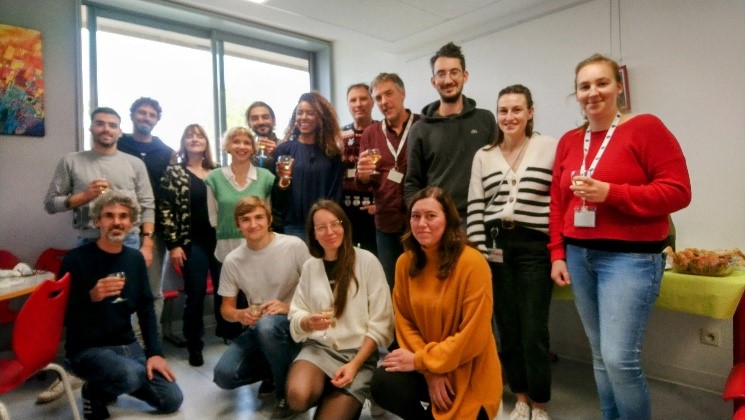Equipe du Dr Bernard Mari et du Dr Georges Vassaux
Génome non-codant & Pathologies pulmonaires | Public
expert | Grand
public |
TEAM Non-Coding Genome & Lung disorders (B MARI / G. VASSAUX)
Frequently injured, respiratory tissues need to orchestrate various proliferation, migration and differentiation programs to restore tissue integrity. Failure of the repair program can directly or indirectly cause lung diseases such as lung cancer or fibrosis. Historically, our team has explored the complexity and implication of non-coding RNAs in pathological lung tissues. Two novel axes have been developed with the aim to study the consequences of chemical exposure in the lung and decipher the origins of the adaptive non-genetic resistance to immune effectors and cancer therapies. These three research programs will converge to identify targets (in particular non-coding RNA), define their mode of action and propose and validate new therapeutic strategies. Both basic and clinical aspects are addressed, notably to optimize and evaluate the efficacy of RNA-targeted therapies using state-of-the-art imaging and single-cell pharmacogenomic approaches.
Our team is integrated within the IHU “RespirERA” and has also developed a national (RESPIRent group, SPLF) and European (Giessen University) network of pneumology teams. It is also associated with the CRISPR SCREEN UniCA platform (https://services-numeriques.univ-cotedazur.fr/plateformes/plateforme.php?id=10)
Some of the major impacts of our project include:
• Advance in knowledge of the non-coding genome in lung cancer and fibrosis,
• Inclusion of ncRNA in stress-associated canonical signaling pathways including hypoxia and chemical exposure,
• ncRNA inhibition as an effective therapeutic strategy in IPF and lung cancer,
• Analysis at single-cell resolution of lung chemical exposure (carcinogens and pollutants),
• Identification of targets to prevent the occurrence of adaptive non-genetic resistance upon cancer treatment.
Axis 1: Analyzing and targeting ncRNAs in chronic lung diseases (B MARI)Our project focuses on two main aspects: 1) characterizing lncRNAs associated with the aggressiveness of lung adenocarcinoma (LUAD), in particular in response to hypoxia, using a combination of bioinformatic and experimental approaches including functional CRISPR-based screens, imaging, biochemical and in vivo experiments ; 2) understanding the regulatory function of ncRNAs in fibrogenic processes with the aim to optimize and evaluate the efficacy of RNA-targeted therapies using a combination of state-of-the-art imaging and single-cell pharmacogenomic approaches on both mouse models and patient-derived effector cells.
Axis 2: Understanding the consequences of chemical exposure in the lung at the single-cell level (G VASSAUX)The objectives is to document the molecular consequences of chemical exposure on normal and pre-pathological lung tissues using state-of-the art genomic technologies. The effects of non-genotoxic carcinogens (NGTX) as well as environmental and atmospheric pollutants are studied on human lung epithelia cultured at the air/liquid interface (ALI) and whole lungs of healthy and pre-fibrotic mice, respectively. The objectives are to obtain transcriptional signatures of NGTX as well as data on the exacerbation of the fibrotic pathology by polluted environments. The project focusing on the mechanism of action NGTX has a strong valorization potential (ie: predictive carcinogenicity test for NGTX). This axis is at the heart of the NewGeneToxIV program funded by BPI-France composed of 2 SMEs and 3 academic labs. A joint laboratory (Lab Com) has been created between our team and the Immunosearch company, the 2 main actors of this program.
Axis 3: Predictive profiling of single-cell sensitivity to immune effectors and cancer therapeutics (J ROUX)We are creating a novel discovery platform for drug target identification in cancer, based on a pioneering technology developed by the group. The innovation combines multiple live-cell experimental technics (imaging, single-cell isolation & profiling...) with artificial intelligence methods to identify new therapeutic targets at the origin of cancer cell resistance. These targets are particular and new as they act on cell state transition between resistant and sensitive to a primary drug of interest. By discovering co -targets for rational drug combinations, we aim to increase the success rate of immunotherapies in development for lung and gastrointestinal cancers. Our systems biology group (co-affiliation of J. Roux in the MaCBES team at INRIA), is hoping to launch a start-up biotech commercializing these targets and our cutting-edge technology
L'équipe est membre de :
| Action Structurante CRISPR Screen, soutenue par Canceropole PACA | Labex Signalife
| Fédération Hospitalo-Universitaire (FHU*) OncoAge |
| |  |  |
*Les FHU ont pour objectif de dynamiser la recherche en réunissant autour d’une même thématique prioritaire et novatrice, des chercheurs, des enseignants et des personnels hospitalier
Photo de l'équipe

Financements